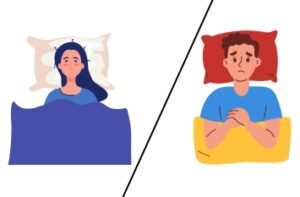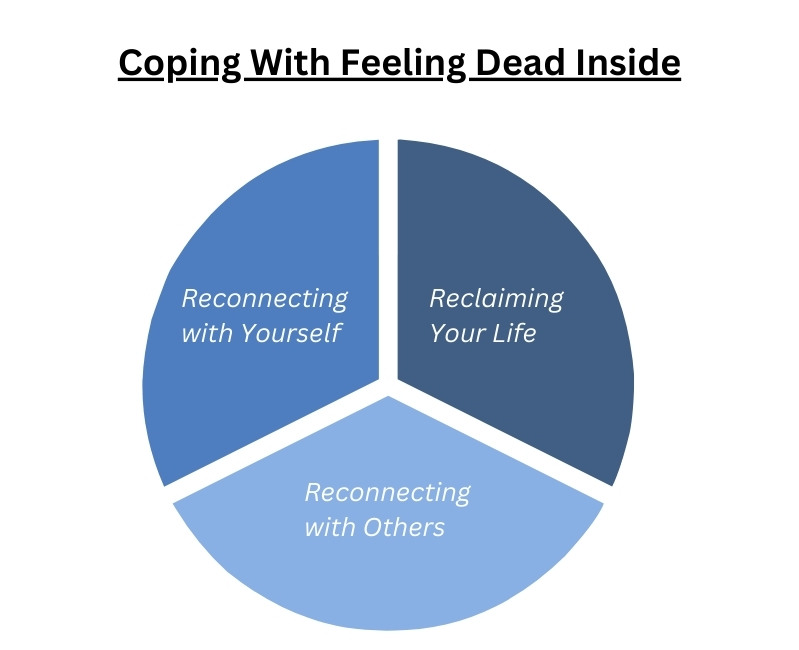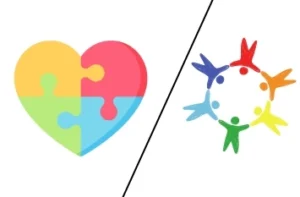
Understanding Insomnia: How We Can Help You Get the Rest You Deserve
Understanding Insomnia: How We Can Help You Get the Rest You Deserve Sleep is the cornerstone of good health, fueling our bodies and minds to

Have you ever found yourself going through the motions of life, feeling detached, empty, or just plain numb? If you have ever asked, “Why do I feel dead inside?” you’re not alone. This pervasive sense of emotional deadness can affect anyone—teenagers grappling with identity issues, adults facing life’s relentless pressures, and even those who seem to have it all. But is this merely a phase or something deeper, like a mental health disorder?
Let’s explore this complex emotional state and uncover what might be driving these feelings. Whether you are a parent worried about your teenager or an adult struggling to find joy, understanding this phenomenon is the first step towards reclaiming your emotional well-being.
Feeling “dead inside” is more than just having a bad day or feeling a bit down. It’s a profound sense of emotional numbness, where you might feel disconnected from your own feelings, thoughts, and even from the world around you.
This state can make everyday activities feel like a chore, robbing you of the joy and satisfaction that usually come from life’s experiences. It’s not uncommon for people experiencing this to describe it as living in a fog, where nothing seems to matter and everything feels distant.
Feeling “dead inside” is more common than many people realize, but it’s not something that should be ignored. While everyone experiences periods of emotional numbness from time to time, especially during stressful or traumatic events, persistent feelings of emptiness are a red flag.
It’s a signal that your mind and body might be overwhelmed and unable to cope effectively. For teenagers, it can be a response to the tumultuous changes and pressures of growing up. For adults, it might stem from burnout, unresolved trauma, or chronic stress.
Although it’s a common experience, it’s important to take it seriously and seek support. Emotional numbness is your mind’s way of telling you that something needs attention and care.
When you say, “I feel so dead inside,” it can be challenging to pinpoint exactly what you’re experiencing. However, several common signs and symptoms can help identify this state of emotional numbness. Recognizing these symptoms is the first step toward understanding and addressing the underlying causes.
Emotional numbness isn’t a simple issue; it can be triggered by several underlying causes that affect your mental and physical well-being. Here are some comprehensive reasons why you might feel dead inside:
Causes of Feeling Dead Inside:
Depression: This mental health disorder can strip away your ability to feel joy or interest in life. Persistent sadness, hopelessness, and a lack of energy are common symptoms that contribute to emotional numbness.
Trauma & PTSD: Experiencing traumatic events can leave deep emotional scars. Post-traumatic stress disorder (PTSD) often includes feelings of detachment, where it feels safer to shut off emotions to avoid reliving trauma.
Existential Crisis: Questioning the meaning and purpose of life can lead to a profound sense of emptiness and disconnection. This crisis can make everything seem futile and strip away your emotional engagement.
Burnout: Chronic stress, particularly from work or caregiving, can deplete your emotional reserves. Burnout manifests as exhaustion, cynicism, and a feeling of reduced personal accomplishment, making it hard to feel anything at all.
Chronic Illness or Pain: Living with long-term physical health issues can take a toll on your mental health. The constant struggle can lead to feelings of hopelessness and emotional fatigue.
Dissociative Disorders: These disorders, such as dissociative identity disorder, can cause a disconnection from thoughts, feelings, and even your identity. This disconnection serves as a coping mechanism for severe stress or trauma, but it can also leave you feeling emotionally dead inside.

Feeling emotionally numb can be incredibly isolating. Here are some concrete steps to help you reconnect with yourself and the world around you:
Remember, progress is not perfection; it is the goal. Be patient with yourself and celebrate small victories.
Feeling dead inside rarely resolves on its own without intervention. While it’s possible for temporary feelings of numbness to subside with time, persistent emotional numbness usually requires active efforts to address the underlying causes.
Factors such as depression, trauma, and chronic stress often need targeted treatment, including therapy, medication, or lifestyle changes. Ignoring these feelings can lead to worsening mental health conditions, making it essential to seek help from mental health professionals.
Taking steps to understand and address why you feel this way is crucial for healing and regaining emotional vitality.
If you’ve been feeling dead inside for an extended period and these feelings are interfering with your daily life, it’s crucial to seek professional help. Persistent emotional numbness can be a sign of underlying mental health issues that require treatment.
Reach out to PB Psychiatric Services to connect with experienced professionals who can provide the support and guidance you need. Don’t wait for the feelings to pass on their own—getting the right help can make all the difference in your journey to emotional well-being.
If you find yourself constantly thinking, “I feel dead inside,” it’s important to recognize that this feeling is a serious issue that deserves attention. Understanding the potential causes and seeking professional help from resources like PB Psychiatric Services can guide you toward recovery and emotional healing.
Remember, reaching out for support is a vital step in addressing the underlying issues and rediscovering a sense of vitality and joy in life. You don’t have to navigate these feelings alone—help is available and can make a significant difference in your well-being.

Understanding Insomnia: How We Can Help You Get the Rest You Deserve Sleep is the cornerstone of good health, fueling our bodies and minds to

Autism Care Starts Here: Expert Support at Perfect Balance Psychiatric Services Autism Spectrum Disorder (ASD) isn’t just a diagnosis—it’s a unique way of experiencing the
